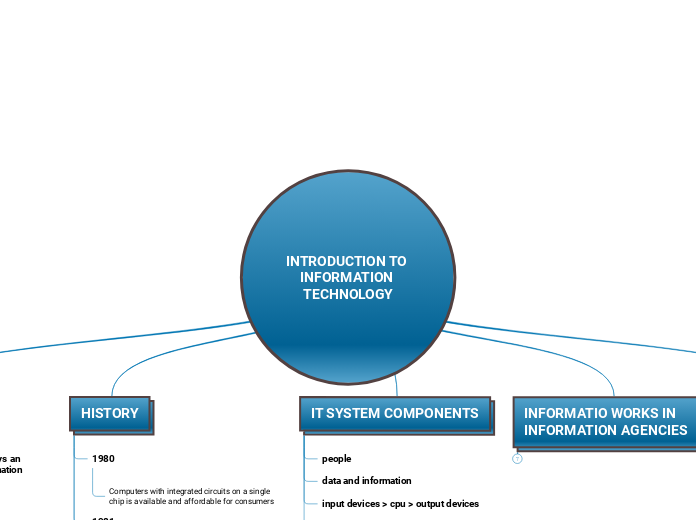INTRODUCTION TO INFORMATION TECHNOLOGY
DEFINITION
Information technology (IT) plays an important role to support information agencies carry out its mission
Recruiters/Agencies
Information technology is a subset of information systems (Boahane & Ditsa, 2001)
Networking events
Information system
system that use information technology to capture, transmit, store, retrive and manipulate or display information use in one or more business process (alter, 1999)
data
the collection of raw unprocessed facts, figures, and symbol
information
data that has been processed to convey understanding experiences, accumulated learning and expertise
HISTORY
1980
Computers with integrated circuits on a single chip is available and affordable for consumers
1981
first IBM personal computer was released
1983
Windows was introduced, followed by Apple Macintosh a year after.
IT SYSTEM COMPONENTS
people
data and information
input devices > cpu > output devices
software, storage and communication services
INFORMATIO WORKS IN INFORMATION AGENCIES
TYPES OF AGENCIES
LIBRARY
5 types of library:
- national library
- academic library
- school library
- public library
- special library
functions
- Acquire, store and preserve printed and non-printed materials for reference purpose
- selecting and organizing a complete information collection to meet user needs
- Assist user to access accurate information fastly
- Assist any formal and informal education
ARCHIVE
2 types:
- public archive
- private archive
functions:
- Retained for legal purposes, for a specific period of time
- Keeps an evidence of the existence, functions and operations of the institution or organization that generated them
MUSEUM
types:
- general museum
- Natural history/ Natural Science Museum
- Art Museum
- history museum
- Science and Technology Museum
FUNCTIONS:
- Identify, acquire, preserve and exhibit unique, collectible or representative object
- Provide experience, through display where visitors can make connection between content and ideas
- Serve as memory institutions for culture
- Support formal and informal learning and research
RECORD CENTRE
GALLERY
MEMORIAL
DATA ADMINISTRATION AND OFFICE ENVIRONMENT
